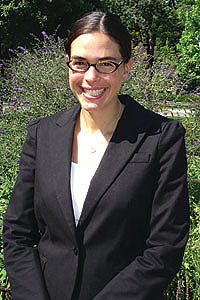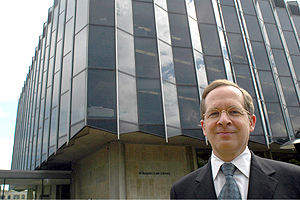Chicago in the News
The Chronicle’s biweekly column Chicago In the News offers a digest of commentary and quotations by a few of the University faculty members, students and alumni who have been headlining the news in recent weeks. Chicago faculty members are some of the most frequently quoted experts, so space allows publishing references to only selected examples.
To read many of the full newspaper articles mentioned in this column, visit the In the News column at the University News Office Web site: http://www-news.uchicago.edu/.
When high-achievers choke
 Sian Beilock | |
Research by Sian Beilock, Assistant Professor in Psychology and the College, was described in a Friday, Feb. 23 Wall Street Journal story. The article reported on research presentations that were given at the annual meeting of the American Association for the Advancement of Science, at which Beilock presented her work on performance pressure and how it affects those who have high working memory systems. According to her research, individuals who typically excel in strategically solving problems rely on their working memory, which diminishes when they are put under pressure. These individuals lose their edge and perform poorly, often by taking the short cuts of guessing or estimating. Articles about the AAAS meeting and Beilock’s research also appeared in the Boston Herald, Education Week and Forbes. The results have implications for the evaluation of performance on high-stakes tests, such as those needed to advance in school and college entrance examinations.
529s’ benefits pay for their fees
Austan Goolsbee, the Robert P. Gwinn Professor of Economics in the Graduate School of Business, was quoted in a Friday, March 2 article published in the Chicago Tribune. The story reported on college savings plans, or 529 plans, as they are known, and how competition is improving those plans in some states. “The issue with these plans has always been and continues to be that the expenses are ridiculously high. They are taking away a chunk of your tax benefit in the form of fees,” said Goolsbee. He added that he considers plans that charge an annual fee approaching 1 percent of assets expensive.
Chicago’s bid for the big games
Allen Sanderson, Senior Lecturer in Economics and the College, discussed Chicago’s bid for the 2016 Olympic Games in an interview on WBEZ’s 848 program. The program aired Friday, March 2. He also was a guest on CLTV, discussing the same subject, on Tuesday, March 6.
‘Proof in the pudding’
John Q. Easton, Executive Director of the Consortium on Chicago School Research, was interviewed for the 5 p.m. newscast Tuesday, March 6, on WMAQ-TV Channel 5 and on the 6 p.m. newscast on WBBM-TV Channel 2. Easton discussed a recent report that shows Chicago Public Schools’ elementary school students increased their scores on state achievement tests in 2006. Easton also was interviewed for a Chicago Tribune story that appeared Tuesday, March 6. At the school district’s request, the consortium analyzed the test scores and found the gains were accurate. However, Easton noted that the new state test allows students more time to complete their answers. “It may mean that it’s a more accurate assessment. But you just can’t help but assume that this gave our kids an advantage. The proof in the pudding is what happens between 2006 and 2007.”
A guest in Afghanistan
Alumnus Alex Dehgan (Ph.D.,’03) was featured in the Tuesday, March 6 New York Times, which noted his conservation efforts and foreign policy work around the globe since receiving his doctorate from Chicago. Dehgan is leading a three-year project in Afghanistan, which is a joint effort of the Wildlife Conservation Society and the Afghan government, and is funded by the U.S. Agency for International Development. When asked how Afghans have reacted to the program, Dehgan said: “Extremely positively. One of the things science gives us is a common language that transcends culture. The respect for science is tremendous in the Islamic world. You look at the biological process the same way, no matter what your religion.” He added, “One of the things we established is a reputation for following through. We have to be mindful of the fact that we are guests in this country, which means respecting the local culture and tradition, not coming in with an imperialistic perspective.”
Survivors must be diligent
A new University study led by Tara Henderson, Instructor of Hematology/Oncology in Pediatrics, was featured in the Wednesday, Feb. 28 Chicago Sun-Times and HealthDay.com. The study shows that childhood cancer survivors are nine times more likely to develop sarcomas—uncommon cancers of connective tissues such as bone, fat or muscle—than are people who did not fight off cancer at a young age. “This study is a red flag,” said Henderson in the HealthDay story, “and it shows that if a patient with a history of childhood cancer later presents with a lump and a bump anywhere on his or her body, you need to be more suspicious of sarcoma than you would be for someone in the general population.”
General creditors lose out
 Douglas Baird | |
Research conducted by Douglas Baird, the Harry A. Bigelow Distinguished Service Professor in the Law School, and colleagues from the University of California, Davis, and the IMD Business School in Lausanne, Switzerland, was featured in a story published in the Wednesday, Feb. 28 Wall Street Journal. The study looked at how creditors fared in 139 corporate bankruptcy cases between 1995 and 2001. “The cold reality is that Chapter 11 does nothing or close to nothing for ordinary general creditors in the typical small-business bankruptcy,” the authors wrote. “In the typical case, secured creditors are paid, the lawyers are paid, and the balance goes to the tax collector. Little or nothing remains for anyone else,” they added.
Price is right . . . if you can pay it
Matthew Gentzkow, Assistant Professor of Economics in the Graduate School of Business, was quoted in a Sunday, Feb. 25 Chicago Tribune article about demand-based pricing for entertainment tickets. The article noted that entertainment marketers have become more sophisticated in matching ticket prices to demand for them. “A key consideration is the cost of having to keep changing prices. Airlines spend millions of dollars on computer systems and employ a lot of smart people to keep track of it all,” said Gentzkow. Demand-based pricing for entertainment tickets works best when it does not alienate the people making the purchase. Amazon.com experienced a backlash when it tried offering different prices to different people. “They were using their data in a very logical way,” Gentzkow said, “but people really didn’t like it. It was perceived as unfair. And people don’t like it when things change.”
![[Chronicle]](/images/sidebar_header_oct06.gif)